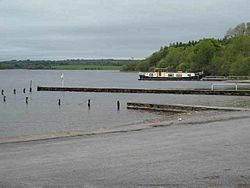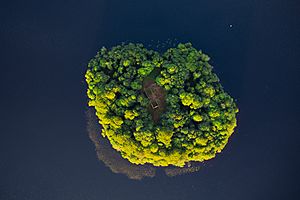Inchmacnerin Abbey facts for kids
| Inis Mac nEirinn | |

Jetties at Tawnytaskin, looking towards Church Island
|
|
| Monastery information | |
|---|---|
| Other names | Eas-mac-neire; Inis-mac-n-erin; Insula-Macnery; Insula-Machum; Inch-vicrinni |
| Order | Canons Regular (Augustinians) |
| Established | 6th century |
| Disestablished | before 1596 |
| Mother house | Arrouaise Abbey |
| Diocese | Elphin |
| People | |
| Founder(s) | Columba |
| Architecture | |
| Status | inactive |
| Style | Norman |
| Site | |
| Location | Church Island, Lough Key, County Roscommon |
| Coordinates | 53°59′40″N 8°15′39″W / 53.994501°N 8.260823°W |
| Public access | yes |
| Official name | Inchmacnerin Abbey (Church Island) |
| Reference no. | 556 |
Inchmacnerin Abbey (Irish: Mainistir Inis Mac nÉirín) is an ancient place in Ireland. It used to be a monastery, which is a home for monks or nuns. Today, it is a special protected site called a National Monument. You can find it on an island in Lough Key. Its name in Irish, Mainistir Inis Mac nÉirín, means "island of the sons of Éirín".
Contents
Where is Inchmacnerin Abbey?
Inchmacnerin Abbey sits on a small piece of land called Church Island. This island is about 2.1 hectares (5.1 acres) in size. It is located in the western part of a beautiful lake called Lough Key.
The History of Inchmacnerin Abbey
Early Days: 6th Century Beginnings
A very old religious site was built on Church Island around the 6th century AD. Many people believe that Columba, also known as Saint Colum Cille, founded this first monastery. The island's name, Inchmacnerin, comes from this early time. It means "island of the sons of Éirín".
Becoming an Augustinian Priory
Later, between 1140 and 1170, the site was re-established. It became an Augustinian priory. A priory is a type of monastery, often smaller than an abbey. The Augustinians were a group of canons (like priests) who followed the rules of Saint Augustine.
Writing the Annals of Loch Cé
Some important historical records might have been written here. These records are called the Annals of Loch Cé. They tell stories and events from Irish history. Parts of these annals were also written at Holy Trinity Abbey, another monastery on the same lake.
The End of the Monastery
The monastery stopped operating around 1569. This was part of a big change in Ireland called the Irish Reformation. In 1596, the land was given to a person named William Taaffe.
Discoveries from Excavations
In the year 2000, archaeologists dug up parts of the island. They found pieces of a stone church. These discoveries help us learn more about what the abbey looked like long ago.
 | Delilah Pierce |
 | Gordon Parks |
 | Augusta Savage |
 | Charles Ethan Porter |



